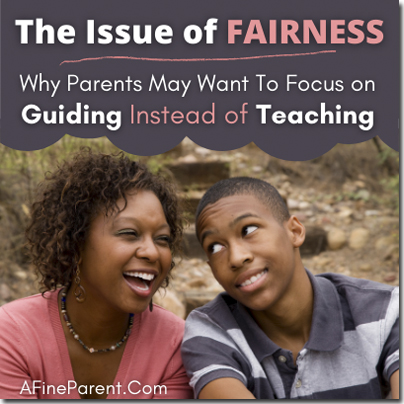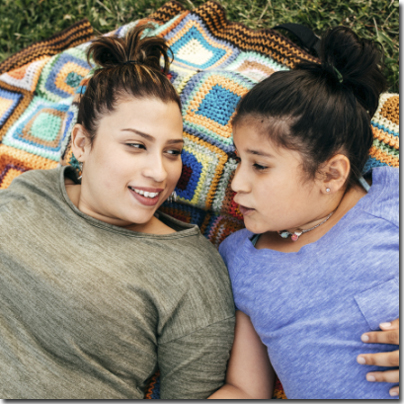 My ex-wife, our teenage son and I were sitting at a table in an airport café. He was telling her about our summer holiday with my parents.
My ex-wife, our teenage son and I were sitting at a table in an airport café. He was telling her about our summer holiday with my parents.
“Why are you so well-behaved?” she said suddenly. “I mean, you’re a teenager! Shouldn’t you be more rebellious?”
Our son pondered the question.
“Do you know what it is?” he said. “I actually think your rules are fair. And if there’s a rule I don’t think is fair, I know I can talk to you about it and you’ll listen.”
His mother and I exchanged a glance. We were delighted, of course, but this had been our intention from the beginning. We wanted our parenting to be fair.
Still…wanting something and achieving it are two different things.
Do you find it challenging to achieve fairness in parenting? Does your child find your parenting fair? And do you and your partner agree on what fairness is?
Rest assured, you are not alone!
Do Children “Feel” Fairness?
 Do children have an innate sense of fairness or is it something they have to learn? The widespread belief is that children are innately selfish, but a recent study suggests that the opposite may be true.
Do children have an innate sense of fairness or is it something they have to learn? The widespread belief is that children are innately selfish, but a recent study suggests that the opposite may be true.
In a psychological experiment reported in Scientific American in 2017, children who didn’t know each other were paired up and one was designated as the “chooser.” The chooser was presented with four candies and the other child was given one candy. The chooser was then offered the following deal:
Choose ‘yes’ and both children get their assigned candies–the chooser with four, the other with one. Choose ‘no’ and neither child gets any candy. Both will have nothing.
The expectation was that most choosers would take the deal. However, with all but the youngest age group, the exact opposite happened. Even though choosers didn’t know the other children personally, they consistently chose to refuse a blatantly unfair deal.
This has implications for us as parents. There is a big difference between believing that we need to teach fairness to “selfish” children and supporting them in a direction they are naturally heading in.
So, where do we start?
#1: Finding Fairness by Addressing Unfairness
 They say that “No one has a monopoly on the truth.” Well, the same could be said for an absolute definition of fairness.
They say that “No one has a monopoly on the truth.” Well, the same could be said for an absolute definition of fairness.
We all have our opinions. We all think we know what fairness is. But even our partners may have subtly (or even very) different ideas on fairness and how it should be put into practice.
Ultimately, “fairness” is an abstract concept; an ideal that we strive towards. And trying to explain an abstract concept to a child…that’s hard.
“Unfairness,” on the other hand, is more concrete.
When a child complains that, “it’s not fair,” they mean something concrete and specific. Her brother got more ice cream than she did. He can’t finish the cartoon he’s watching because dinner is now ready. They hate having to go to school.
What does this mean for parents?
It means that instead of striving for a utopian ideal of parental fairness, it actually works better to deal with unfairness, one incident at a time. So long as we have a workable strategy, the effect is cumulative. By moving away from unfairness step by step, we end up in “fairness” almost by accident.
An added bonus is that it saves on arguments. Even when we were married, my son’s mother and I disagreed on the issue of “fairness” in its broadest sense; but on the issue of whether it was unfair to make our son share a favorite toy with another child against his will…that was a concrete issue we could discuss and reach an agreement on.
So, what is a workable strategy? Here are some ways to try working towards fairness by addressing unfairness:
1. Recognize a learning opportunity:
We can force a child to listen, but we can’t force them to be open to what we have to say. However, when a child complains that something is not fair, they are open! Whatever they’re upset about, they care! And, because they care, this might be the moment we can get through to them.
These windows of opportunity open and close at a moment’s notice and they tend to come at the worst possible times. It may mean having to stop the car, put dinner on hold, or lose our place in line. But these sacrifices pay dividends in the long run.
Plus, these sacrifices do not go unnoticed. My son is now a young man, but he still remembers how his dad would drop everything and listen to him in those moments he needed it.
2. Really listen:
 The impact of truly listening is a massive topic in its own right. If there is anything which engenders a child’s trust in a grown-up more than feeling heard by them, I don’t know what it is.
The impact of truly listening is a massive topic in its own right. If there is anything which engenders a child’s trust in a grown-up more than feeling heard by them, I don’t know what it is.
I have seen children share their true thoughts with relative strangers rather than their own parents, simply because those strangers listened.
Remember, active listening is more than just being quiet while our children talk. We can demonstrate that we’re listening by:
- Facing them and holding eye contact.
- Uncrossing our arms, showing with our body language that we are open to what they’re saying.
- Making a point of turning off a television or putting a device to one side.
In addition, true listening does not mean hearing a child out and then telling them what we think. When a child opens up, parents are sometimes tempted to use that moment to try and “correct” them in some way.
Resist the temptation. Instead, we can try this:
3. Ask “What do you think?”:
Asking a child what they think is like casting a magic spell; unless they really don’t trust us, out will pour all the information we need to effectively handle any given situation. More often than not, that means doing nothing except listen.
If a child feels confident we have heard them, that may be enough. They can figure out for themselves what they can change and what they can’t. And even if they get it wrong, that’s part of the process. This can be hard for us as a parent to witness, but it’s important to know when not to interfere.
And if there is something for us to do, it is likely to become clear once we understand what our child really needs beyond what they want.
There is a psychological principle at work here. Head teacher and psychotherapist Andrea Nair talks about how a child’s core beliefs are affected by the way a parent treats them.
For instance, if a mother makes a habit of active listening, this will encourage a core belief in the child of “Mummy listens to me. What I say matters to her.” However, if the tendency is not to listen—or to listen and then give obvious weight to your own opinion —then the core beliefs will be less positive: “Mummy doesn’t care what I think. She just wants me to listen to her.”
If we can identify our child’s core beliefs (whether positive or negative) it points to areas where our parenting approach is working and flags those areas which require further attention.
Added bonus to active listening: When we listen to a child’s thinking, we discover who they are and who they are becoming as they grow up!
#2: Exercise Parental Authority with Fairness
 Does the phrase “parental authority” conjure up the image of a strict, controlling parent whose offspring cower in fear of them?
Does the phrase “parental authority” conjure up the image of a strict, controlling parent whose offspring cower in fear of them?
That is not authority. That is tyranny. And tyranny is the opposite of fairness.
In his book, “Toddler Taming,” Dr. Christopher Green says that children have an inner drive to grow up. Healthy children want to learn. They want to become independent. And part of this drive is to push back against a parent’s control.
This presents a conundrum for moms and dads.
On the one hand, we have to assert some authority over our children, otherwise our household will descend into chaos. On the other hand, we don’t want to squash their inner drive towards independence. So, what do we do?
Here is the key, according to Dr. Green’s research:
Children in general accept authority, so long as they perceive it to be fair and consistent.
He also observed that parents whose authority was inconsistent or perceived as unfair would often have difficulties with their children’s behavior. That the inconsistency bred confusion, and the unfairness bred resentment.
In short, children benefit from fair parental authority.
But how does one achieve that? Here are some ways we can try to align our parental authority with fairness:
1. Determine basic principles:
As parents, we have quite literal power over our children, especially when they are small. How we handle that power will largely determine whether our children respect us or are afraid of us. And the kind of authority that children (and grown-ups) respect is authority based on principles.
A principle is what we believe to be a fundamental truth. That is to say, something which is true 100% of the time in 100% of situations. In the context of parenting, this means something which stays true throughout a child’s childhood, from toddler to adolescent.
Ultimately, the principles we base our parental authority on will vary from parent to parent, depending on what we believe in. For example, the principles that led my personal parenting style included:
- Always keeping my word
- Never telling a lie
- Never directing anger towards a child
One of the privileges we have as parents is that we get to choose the principles we want to apply to our parenting. The important thing is to believe in them 100% because they form the basis for the next step.
2. Create rules based on principles:
Rules change as children grow up. Principles stay the same. But when rules are based on principles, they are much easier to communicate to children. This is especially true when you have to make one rule for one child and another rule for another.
For example, when I was looking after my son and his best friend, my son was allowed to cross the road on his own whereas his friend had to hold my hand. As they were about the same age, the other boy protested.
“It’s not fair!” he said. “Why do I have to do it and he doesn’t?”
I explained to him that one of my principles is for children in my care not to get hit by a car. However, my son had learned the rules of crossing the road safely. He was only allowed to do it with me watching, but he obeyed the rules at all times.
“You, on the other hand,” I went on, “forget those rules when you get excited. Do you remember that time you ran after a pigeon and I had to grab you?”
The boy looked sheepish and nodded.
“Listen,” I said. “When I’m convinced that you can follow the rules of crossing the road safely, you can do it on your own. But until that happens, you have to hold my hand. Understood?”
He did understand and he accepted it. Although the rules for him and my son were different, the principle was the same. He saw that and he thought it was fair. (I also mentioned this to his mother when she came to pick him up and she fully endorsed what I told him.)
As he got older, of course, he showed that he could be trusted, so I updated the rule. But it was still based on the principle of “protecting children from cars.” It was just a different application.
3. Allow children to speak their minds:
 Neither my ex-wife nor I had childhoods where we felt free to speak our minds, so we were determined we would do things differently with our son. And because we regularly asked him, “What do you think?”, he often had things to say about his own upbringing.
Neither my ex-wife nor I had childhoods where we felt free to speak our minds, so we were determined we would do things differently with our son. And because we regularly asked him, “What do you think?”, he often had things to say about his own upbringing.
If our son felt a parental decision was unfair, he was allowed to say so and we’d ask him why. If we agreed with his reasoning, we’d alter the decision. For example, if he remembered a promise we had forgotten we’d made.
But if we disagreed, we’d say “nice try!” and he had to abide by our decision.
The result?
Our son learned that being smart and observant could get him what he wanted better than misbehaving. He became extremely good at spotting loopholes and inconsistencies in our parental communication.
This, in turn, forced my ex-wife and I to raise our game. We’d let our son have his win, then next time create more effective, loophole-free boundaries.
It was, in effect, a self-correcting system. And because he was allowed to have a say, our son felt this system was fair.
When allowing children to speak their minds, it’s important not to give them the impression they are wrong if they dislike or disagree with our principles or rules. So long as we are consistent and “walk our talk,” children will know where they stand. Our main responsibility is to set an example; to demonstrate that we believe in our principles by acting in accordance with them.
That is how children learn to develop principles of their own.
#3: Focus on Modeling Rather Than Teaching
 My mother has a favorite story about me as a toddler.
My mother has a favorite story about me as a toddler.
I was doing a jigsaw puzzle. Apparently, my method was to choose one piece at random, then go through piece after piece, trying to fit each one to my random piece. It was taking ages.
Mom came over and sat next to me. She showed me how to identify pieces with corners and straight edges. She made one side of the puzzle to demonstrate. Then she left me to carry on by myself.
The moment she was gone, I broke the puzzle up and started again from scratch. I chose one piece at random…and went through piece after piece after piece…
Was this evidence of a stubborn spirit? Or is it simply human nature to want to discover things for ourselves?
I subscribe to the latter. To me, “teaching” suggests a process whereby information inside a teacher’s head is somehow transferred into the child’s head. And there are times when this is necessary.
But when it comes to your child, you want the information in that teacher’s head to be of good quality, right? Even if the teacher is you.
For myself, I do have stuff in my head which I believe to be sufficiently accurate: my knowledge of the English language; basic math; knowing how to tie a shoelace. I would feel confident teaching those things to a child.
But fairness?
I’m no sage or spiritual master. I’m not qualified to teach moral values to anyone, let alone a little child. And yet, with my son, that is precisely my responsibility. So what to do?
I believe the answer is not to “teach” fairness … but to model fairness.
If I want my son to grow up into an honest man, then I need to be an honest man. If I want him to keep his word, then I need to keep my word. If I want him to treat people with fairness, then I need to treat people—and not just him—with fairness.
So what are the basic principles of this approach?
1. Own what you believe to be true:
Instead of saying, “this is what fairness is” we can say, “this is what I think fairness is.” The difference is profound.
My then-wife and I were met with criticism when we first decided to try this approach. The argument was: Children need certainty and saying “I think” suggests uncertainty.
But the fact is, we are uncertain. No one has a monopoly on the truth! We can instead focus on making sure that our actions are consistent with our beliefs. Actions really do speak louder than words.
It also communicates to our children that there are notions of fairness outside of what Mommy or Daddy thinks. And it’s a great opportunity to ask the child, “What do you think?”
2. Dialogue, not monologue:
Can dialogue actually improve the development of a child’s brain? A recent study carried out by a team from Harvard, the Massachusetts Institute of Technology, and the University of Pennsylvania suggests that it can.
A group of children aged four to six years was tested for verbal and reasoning skills, then MRI scans were made while they listened to a story to show their brain activity. Afterwards, the families were sent home with a pocket voice recorder for the children and asked to keep the recorder on for the waking hours of an entire weekend.
When the recordings came back, they were analyzed by computer to identify the different types of talking the child was exposed to. For example, adults talking in monologues was distinguished from back-and-forth dialogues with the child.
What researchers saw was that in households with higher levels of back-and-forth conversational “turns” (interaction) between adults and children, those children had scored higher in the tests and their MRI scans showed more brain activity.
According to Rachel Romeo, lead author of the study, this suggests that parents who talk with their children rather than at them actually help their intellectual development.
How can we put this into practice?
Well, let’s say your little boy throws a toy at a window, which bounces off. Instead of saying, “Hey, don’t do that! You might break the window!” try this:
Get down to his level, look him right in the eye and calmly say: “You just threw a toy at the window. What do you think about that?” Then watch his reaction.
Maybe you’ll see that “wheels turning in the head” expression, culminating in a look of realization as the child figures out for himself that the window might have broken. Alternatively, you might get the “hand in the cookie jar” look, which means the child knew full well that he was crossing a line. Or you might get the defiant, “Yeah, I did it! What are you going to do about it?” reaction, which indicates a more complicated situation.
Whatever the reaction, it’s the beginning of a dialogue.
3. Offer advice in the form of options:
Children often encounter unfairness in situations where we can’t easily intervene, such as within their peer group at school. Is there a way we can offer guidance without making them feel like we’re “telling” them?
A technique which has stood me in good stead throughout my own parenting has been to couch the advice within a series of options, then let my son decide for himself.
The beauty of this approach is that we can tailor the options to suit the situation: general options for quick decision-making or specific options for a more in-depth discussion.
For example, if a child is struggling with an issue, general options might look like this:
- Get a grown-up to help
- Handle the issue alone
- Do nothing
Any of these options can lead to a revealing conversation. Option one may lead to the revelation that our child lacks confidence in a particular school teacher. Or that they strongly believe in fixing their own problems. Or that they don’t believe in fixing a problem because they see it as someone else’s fault.
The important thing to remember is that this is a dialogue, not a “lesson.” And if a child chooses a particular option, it is important to respect their choice- even if we disagree with it.
This does not mean we do not state our own moral position. In fact, children need to know where their parents stand on issues such as fairness and this is a good opportunity to let them know. But remember to own it. Children who do “the right thing” to make their parents proud of them are not operating from the same place as children who genuinely realize something.
My own son would frequently choose the “do nothing” option. I would say, “Fair enough” and let it go, knowing full well that he would soon experience the consequences of his inaction. Nine times out of ten, he would come to his own conclusion that he had to do something…and then the discussion was on how to do it.
Parenting with Fairness
 After the chat at the airport café, my son went home with his mother and I went back to my home. But as I sat on the train, it occurred to me that in order to find our parenting fair, our son had to have his own concept of fairness which he believed in.
After the chat at the airport café, my son went home with his mother and I went back to my home. But as I sat on the train, it occurred to me that in order to find our parenting fair, our son had to have his own concept of fairness which he believed in.
That realization gave me enormous peace of mind. The day was fast approaching when our son would have to make his own way in the world and one of our worries was, “Will he be okay on his own?” The world can be a tough place.
But a clear set of values is an important piece of equipment when it comes to navigating that world. And if our children grow up and leave home with their own concept of fairness, I believe we fulfill one of our most important responsibilities as parents.
From that point on, the rest is up to them.
The 2-Minute Action Plan for Fine Parents
Having a clear vision of what you believe fairness is and how you will apply it as a parent is a long-term strategy, not a short-term fix.
However, here are three things you could try that only take a couple of minutes:
- Stop and breathe.
Believing in the principle of fairness and acting on it when your offspring has accidentally (or even deliberately) spilled their drink in your laptop are two different things. Yet these are the moments when a just response – as opposed to an overreaction – are most needed.
So take a minute to “stop – breathe in – think ‘fairness is important’ – breathe out”.
- Do a quick check of your mindset.
Parents are generally unfair when they are tired, stressed or not thinking straight. And sometimes just taking a moment to see that (whether looking at yourself or someone else) can make a profound difference in attitude. Remember, this is about self-awareness, not self-flagellation.
- Ask the child, “What do you think?”
If there is a two-minute action which can pay huge dividends, it’s this one. Just take that moment to hear what the child has to say. And remember the principles of active listening: make eye contact, put down your phone, resist the temptation to talk, etc.
The Ongoing Action Plan for Fine Parents
When it comes to a long-term parenting strategy, here are three things which worked for me:
- Articulate what you believe in.
People may have different ideas about fairness, but the clearer you are on what you believe, the better you can communicate it to your children. However, putting what you believe into words can be hard. It takes time and humility, but it is well worth the effort.
- Have regular “debriefs” with your parental partner.
The value of sit-down meetings with your co-parent to discuss how things are going cannot be overstated. Taking the time to share and listen to your co-parent’s ideas and beliefs on fairness will only increase your ability to support each other. And don’t forget that active listening skills are just as applicable here!
- Determine your attitude to unfairness.
When you’re setting the example of adult behavior to a child, how you deal with unfairness has just as much impact as your beliefs on fairness. So, consider what you think and come up with a plan for handling situations with people who don’t hold the same definitions of fairness as you.
great article thank you so much
Beautiful read, it’s a win win situation,works both ways.
Did you or your child attend a Montessori school? This is straight out of their playbook (which is a good thing).
No, we didn’t. Interesting to hear, though. (I wonder if this is the Anna Karenina principle in action?)
This is a great read for parents of kids of all ages. I totally agree with the implicit strategy provided by the author of letting your child work out fairness in their own way rather than trying to hand them your version of it. Only thing I would do as a parent is to help them see the facts and realize the consequences of their actions, but then letting them make their own conclusions on what went well or not in that particular instance.
Glad you liked it. Thank you.
Great article. Thankyou for this excellent articulation.
You’re welcome!